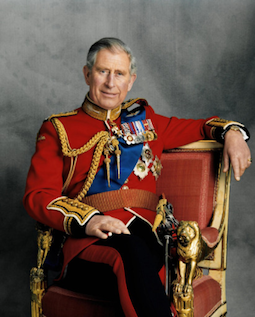 The Prince of Wales’ multi-focussed interests, ranging from a concern for the built environment to sustainable farming practices to rainforest preservation, and from humane architecture to his serving as a principal interlocutor between Islam and the West, and—above all—to his work among youth and enterprise through the Prince’s Trust—have for decades found increasing resonance amongst Canadians, with a party of eminent Canadians visiting some of the Trust’s operations in the mid-2000s to see how they might be extended or applicable to Canada. After several false starts, the desire of the Prince and key supporters here to have HRH’s future role as King of Canada strengthened by encouraging a Canadian expression of his many initiatives and concerns, well known in Britain via the Trust, came to fruition with the establishment of Prince’s Charities Canada which was extensively covered in the Spring, 2014 edition of Canadian Monarchist News And the personal presence in Canada of the heir to Canada’s throne has long been a familiar sight.
The Prince of Wales’ multi-focussed interests, ranging from a concern for the built environment to sustainable farming practices to rainforest preservation, and from humane architecture to his serving as a principal interlocutor between Islam and the West, and—above all—to his work among youth and enterprise through the Prince’s Trust—have for decades found increasing resonance amongst Canadians, with a party of eminent Canadians visiting some of the Trust’s operations in the mid-2000s to see how they might be extended or applicable to Canada. After several false starts, the desire of the Prince and key supporters here to have HRH’s future role as King of Canada strengthened by encouraging a Canadian expression of his many initiatives and concerns, well known in Britain via the Trust, came to fruition with the establishment of Prince’s Charities Canada which was extensively covered in the Spring, 2014 edition of Canadian Monarchist News And the personal presence in Canada of the heir to Canada’s throne has long been a familiar sight.
As a young man, Charles dove under the Arctic ice cap, emerging with an inflated suit to make him somewhat resemble the Michelin Man of the tire manufacturer’s advertising fame! However amusing the photograph, the dive was a deliberate and carefully staged event by the Trudeau government. No better image could have informed the world in 1970 of Canada’s assertion to sovereignty over its northern lands and water passages, a role then being tested by both the United States and the Soviet Union. Themed homecomings, linking the Prince’s interests to Canadian values and concerns, have been part of a strategy whereby Charles has come to know Canada, and Canadians have gained impressions of their future King in person rather than through the often-distorted, if not entirely false, lens of tabloids fed to us over the news wires.
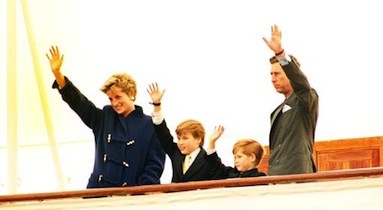 Given that the Royal Family, like any family, has gone through its ups and downs, Canadians also have come to know Charles through our sharing in the good and bad times of his life. We hailed his bride, Diana, Princess of Wales, during the couple’s triumphant Maritime tour in 1983, while in 1986 no less adulation accompanied a British Columbia tour culminating in their visiting Expo 86 in Vancouver. A warm welcome also came to them throughout an Ontario tour in 1991. It was on this occasion that Charles and Diana were memorably reunited with their sons, William and Harry, aboard HMY Britannia, which was docked in Toronto Harbour.
Given that the Royal Family, like any family, has gone through its ups and downs, Canadians also have come to know Charles through our sharing in the good and bad times of his life. We hailed his bride, Diana, Princess of Wales, during the couple’s triumphant Maritime tour in 1983, while in 1986 no less adulation accompanied a British Columbia tour culminating in their visiting Expo 86 in Vancouver. A warm welcome also came to them throughout an Ontario tour in 1991. It was on this occasion that Charles and Diana were memorably reunited with their sons, William and Harry, aboard HMY Britannia, which was docked in Toronto Harbour.
In common with a world perhaps too easily forgetful of the deep unhappiness marriage breakdown inevitably brings to our own family and friends, Canadians eagerly consumed details of subsequent unhappiness in Charles and Diana’s lives, and made judgments based on, at best, incomplete knowledge of all the circumstances involved. This emotional reaction to the very public breakdown of the Prince and Princess’ relationship was rekindled in the genuine grief coupled with unpleasant hysteria that accompanied Diana’s tragic death in 1997.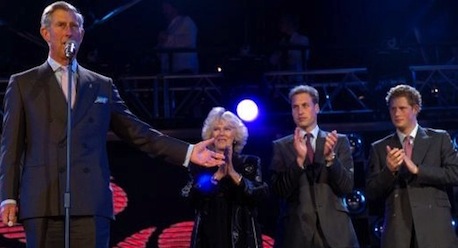
However, like our counterparts throughout the Commonwealth, as time passed many Canadians gradually came to judge Charles less as a figure in a ghastly soap opera and more as whole man, with many talents along with manifest flaws. The burgeoning of support for his various causes, and his evidently close relationship with his sons, led most to wish for him the same happiness so many of us have found in second marriages. This more sympathetic view was apparent by the time of Charles’ marriage to Camilla Parker-Bowles in 2005—and in the warm, welcome given the Prince and Duchess of Cornwall on their first Canadian homecoming as a couple in the fall of 2009, and followed by even more successful tours in 2012 and 2014. The first tour also reminded Canadians of Camilla’s direct ancestral links to Canada, through a former Prime Minister of the Province of Canada, Sir Allan MacNab, a son of Hamilton, Ontario (and builder of Dundurn Castle) who was the Duchess’ great-great-great grandfather.
Canadians joined the Commonwealth and indeed the world in celebrating the engagement and subsequently the Royal Wedding of Charles’ eldest son, Prince William, to Catherine Middleton on April 29, 2011. Only a few months later, the most exuberant Royal Tour in Canadian history – and the couple’s first overseas tour – took place as the Duke and Duchess of Cambridge – universally and affectionately referred to as William and Kate - traveled to many parts of Canada June 30-July 8. Massive crowds hailed them everywhere, responding to both the dignified and fun elements of the program, with over a million people gathering to welcome them in both Ottawa and Calgary! The tour was the more important as an encourage of national unity given the warm welcome TRHs’ received in Quebec.
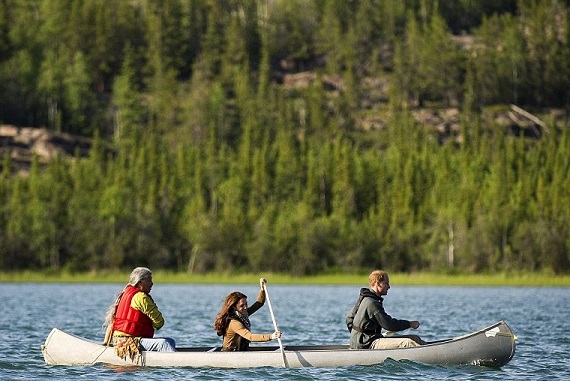
About 40% of Canadian marriages end in divorce, and many couples now choose to live common-law. So one might well consider the old proverb suggesting that people who live in a glass house should not throw stones! We all have friends and quite possibly family members who have found happiness in second marriages or relationships. Whatever our own moral compass, we should hesitate to judge others' circumstances.
Again, as in our own circles, divorce and all that so often accompanies it, tends not to bring great credit on either party. So it was between Charles and Diana. The difference of course is that our own circumstances are generally not played out and exacerbated by so-called "reporting" by journalists and the hounding of the paparazzi. As The Queen has reminded us, distance lends perspective. Since the marriage of Charles and Camilla has Her Majesty's approval, and that of Diana's sons, and evidently makes the couple happy, most reasonable people might say it is time to move on, and that focusing on the past will neither bring back Diana nor make her sons happy.
As well, it is good to remember that our loyalty to the Crown is based on our appreciation of how the system of constitutional monarchy is ideal for Canada - just to make two of many points:
In our own families, we may well like some members and dislike others. But we all pretty well believe that the institution of the family is a good thing. So it is with the Monarchy: our Royal Family is our family on a big stage- we can like some members more than others, but generally think the system of constitutional monarchy suits us well.
First, unless Charles were disabled in some way that prevented his serving as King, changing the succession would require controversial legislation in all 16 Commonwealth Realms.
Second, Charles has trained for kingship during his entire life.
Third, admirers of William should remember The Queen's regret at coming to the Throne so young at a time when she and Prince Philip had young children. Well-wishers of William and Catherine would surely hope that they will enjoy many years to raise their family in the comparative privacy they now can find, before the burdens of occupying the Throne put an end to that freedom. That apart, why would William wish to succeed to the Throne on the basis of supplanting his beloved father?
Fourth, while we have chosen a system of constitutional government, we do not select our Monarch- Canada's King or Queen emerges through an act of love, not by campaigning for office, nor on the basis of personal popularity. Were this so, our monarchy would reflect personal ambition rather than its focus on the well-being of all our peoples.
Charles has no formal constitutional role in Canada. However, in the fullness of time he succeed his Mother, Queen Elizabeth II, as Monarch, and assume the responsibilities of King of Canada. He has had the benefit of a lifetime of training for the position: the shining examples of a beloved Queen, a practical and far-reaching mind which embraces so many concerns of Canadians, decades of familiarity with Canadians' concerns and, more recently, the development of the Prince of Wales' Charities in Canada, which is the umbrella group, similar to the Prince's Trust in the UK, which advances many of his interests in a Canadian context.
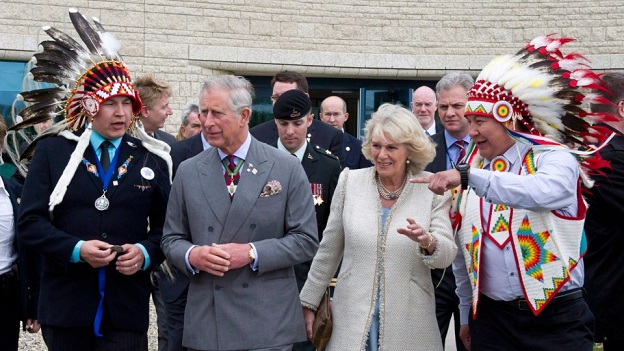
At the time of the Prince of Wales' second marriage, Camilla assumed the title of Duchess of Cornwall, and it was suggested that, on Charles' acceding to the Throne, her title would be Princess Consort. However, in fact she would be Queen(Consort) unless a separate and distasteful legal procedure was taken to bar her from that title. Given the Duchess' faultless public service which has kindled so much admiration in Canada as in Britain, the evident happiness of the Prince of Wales and the enthusiastic acceptance of their marriage by The Queen and Princes William and Harry, it seems entirely possible that Camilla will be accorded the title of Queen at the time of the next accession.
| 2014 | |
| 2012 | |
| 2011 |
|
| 2009 | |
| 2008 2007 |
|
| 2002 | |
| 2001 | |
| 1998 | |
| 1991 | |
| 1986 | |
| 1983 | |
| 1982 | |
| 1977 | |
| 1976 | |
| 1970 |
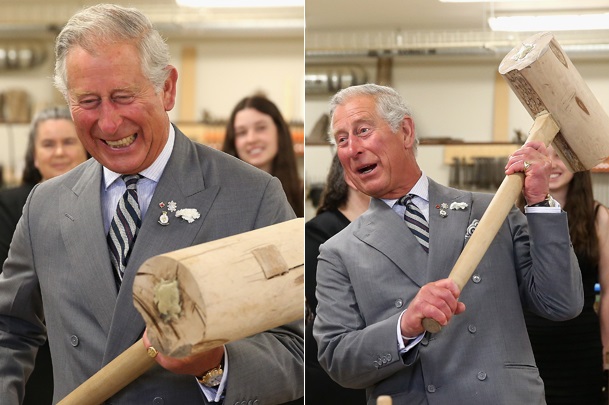
Like other members of Canada’s Royal Family, the Prince of Wales holds a number of honorary military appointments whereby he maintains close touch with units of the Canadian Forces and serves as a focus of pride and a kindling of the esprit de corps and traditions of the regimental families involved. The Princes’s appointments are listed in order of length of appointment.
| 1977 | |
| 1985 | |
| 2004 | |
| 2005 | |
| 2009 |